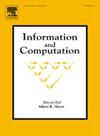基于值迭代的随机平均收益对策和熵对策的通用复杂度界
IF 1
4区 计算机科学
Q3 COMPUTER SCIENCE, THEORY & METHODS
引用次数: 0
摘要
我们开发了基于值迭代的算法,以统一的方式解决具有平均收益类型奖励的不同类别的组合零和博弈。这些算法依赖于一个oracle,评估动态规划算子达到给定的精度。我们证明了确定精确的最优(位置)策略所需的oracle调用次数是,在维度上达到R/sep阶的因子多项式,其中“分离”sep定义为策略产生的不同值之间的最小差,R是一个度量估计,涉及动态规划算子的近似子特征向量和超特征向量的范数。我们通过两个应用来说明这种方法。第一个是一个新的证明,导致Boros, Elbassioni, Gurvich和Makino定理的复杂性估计的改进,表明具有固定数量随机位置的回合制平均收益博弈可以在伪多项式时间内解决。第二个是熵博弈,这是由Asarin、Cervelle、Degorre、Dima、Horn和Kozyakin提出的模型。熵对策的秩定义为由两个参与人的策略决定的所有模糊矩阵中的最大秩。我们证明了具有固定秩的熵对策在其原始公式中可以在多项式时间内求解,并且在相同的固定秩条件下,包含权重的熵对策的扩展可以在伪多项式时间内求解。本文章由计算机程序翻译,如有差异,请以英文原文为准。
Universal complexity bounds based on value iteration for stochastic mean payoff games and entropy games
We develop value iteration-based algorithms to solve in a unified manner different classes of combinatorial zero-sum games with mean-payoff type rewards. These algorithms rely on an oracle, evaluating the dynamic programming operator up to a given precision. We show that the number of calls to the oracle needed to determine exact optimal (positional) strategies is, up to a factor polynomial in the dimension, of order , where the “separation” sep is defined as the minimal difference between distinct values arising from strategies, and R is a metric estimate, involving the norm of approximate sub and super-eigenvectors of the dynamic programming operator. We illustrate this method by two applications. The first one is a new proof, leading to improved complexity estimates, of a theorem of Boros, Elbassioni, Gurvich and Makino, showing that turn-based mean-payoff games with a fixed number of random positions can be solved in pseudo-polynomial time. The second one concerns entropy games, a model introduced by Asarin, Cervelle, Degorre, Dima, Horn and Kozyakin. The rank of an entropy game is defined as the maximal rank among all the ambiguity matrices determined by strategies of the two players. We show that entropy games with a fixed rank, in their original formulation, can be solved in polynomial time, and that an extension of entropy games incorporating weights can be solved in pseudo-polynomial time under the same fixed rank condition.
求助全文
通过发布文献求助,成功后即可免费获取论文全文。
去求助
来源期刊

Information and Computation
工程技术-计算机:理论方法
CiteScore
2.30
自引率
0.00%
发文量
119
审稿时长
140 days
期刊介绍:
Information and Computation welcomes original papers in all areas of theoretical computer science and computational applications of information theory. Survey articles of exceptional quality will also be considered. Particularly welcome are papers contributing new results in active theoretical areas such as
-Biological computation and computational biology-
Computational complexity-
Computer theorem-proving-
Concurrency and distributed process theory-
Cryptographic theory-
Data base theory-
Decision problems in logic-
Design and analysis of algorithms-
Discrete optimization and mathematical programming-
Inductive inference and learning theory-
Logic & constraint programming-
Program verification & model checking-
Probabilistic & Quantum computation-
Semantics of programming languages-
Symbolic computation, lambda calculus, and rewriting systems-
Types and typechecking
 求助内容:
求助内容: 应助结果提醒方式:
应助结果提醒方式:


